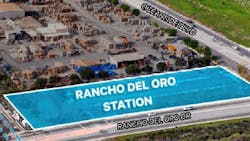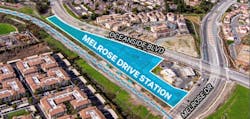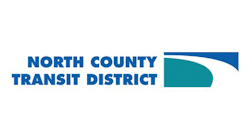The Massachusetts Bay Transportation Authority (MBTA) and North County Transit District (NCTD) are each making progress on their transit-oriented development (TOD) projects, which will include housing, retail and community amenities. The projects focus on creating better housing opportunities for lower income communities near transportation points.
MBTA
The MBTA has completed five Collaborative Agreements to Advance Housing Transit-Oriented Development Projects within the past year. The agreements represent a cross-section of Memorandums of Agreement (MOA), purchase and sale agreements, easements or amendments to existing agreements that make these projects possible.
Under these agreements, the development of nearly 1,000 housing units were made possible, many of which are affordable to lower income communities.
“Housing near public transit is good housing policy, it’s good transportation policy and it’s good climate policy,” said Massachusetts Housing and Livable Communities Secretary Ed Augustus. “Massachusetts is in desperate need of more affordable housing. The Healey-Driscoll Administration is committed to working with our local communities and the MBTA to repurpose underutilized land and transform it into vibrant, livable communities. This housing means more opportunities for families to thrive and call Attleboro home.”
The developments are a part of a statewide housing campaign to call attention to the urgent need to lower housing costs throughout Massachusetts. $12 million in Community Investment Tax Credits (CITC) will go to 54 Community Development Corporations across the state.
“We know that a sound transportation system is vital to ensuring and improving quality of life for riders, communities and businesses that we serve. These collaborative agreements are a testament to the power of partnerships as we all strive to address the need for housing,” said MBTA CEO and General Manager Phillip Eng. “When we invest in public transportation, we are investing in vibrant and sustainable communities. We thank the Healey-Driscoll Administration for their leadership in this critical work as we do our part to support the creation of housing developments that are affordable and equitable.”
The MBTA’s Transit-Oriented Development and Innovative Delivery (TOD/ID) program has led to successful transit-oriented development projects at Assembly Station, Jackson Square Station, Wonderland Station and North Station.
The five MBTA Transit-Oriented Development Collaborative Agreements are as follows:
- Attleboro: The MBTA executed an MOA with the Attleboro Redevelopment Authority (ARA) for a land swap and future sale of MBTA property, which will be combined with ARA property to support up to 600 units of housing adjacent to Attleboro Station – its largest transit-oriented-development yet.
- Salem: The MBTA partnered with the Salem Redevelopment Authority to combine MBTA land with city-owned land, enabling the Winn Companies to build a 120-unit mixed-income housing project, including 48 affordable units, next to Salem Station. This project was a key priority for Massachusetts Lt. Gov. Kim Driscoll during her tenure as mayor of Salem.
- Winchester: The MBTA collaborated with the town of Winchester to sell a parcel of land, which was combined with the town’s property to facilitate Civico’s 56-unit housing project at Winchester Station, featuring 40 affordable units.
- Boston: The MBTA relieved the nonprofit Mission Hill Neighborhood Housing Services of an outstanding mortgage obligation on a former MBTA property, allowing the nonprofit to advance a 100 percent affordable housing project of up to 94 units near Roxbury Crossing Station.
- Swampscott: the MBTA provided a long-term easement to the Winn Companies in Swampscott, enabling a 114-unit mixed-income housing project adjacent to MBTA tracks, with 76 affordable units.
NCTD
The NCTD Board of Directors has agreed to enter into an Exclusive Negotiation Agreements (ENAs) with two developers for redevelopment of two SPRINTER stations in the city of Oceanside, Calif.
The first ENA for the Melrose SPRINTER Station is with USA Properties Fund Inc. and Waterford Property Company, a general partnership. The second ENA for the Rancho Del Oro SPRINTER Station is with S.V.D.P. Management Inc. (Father Joe’s Villages).
“These projects will be instrumental to increasing ridership and enhancing community spaces,” said NCTD Board Chair Jewel Edson. “The addition of housing and amenities at each station improves the convenience of taking transit and will have a positive impact on the surrounding communities.”
The Melrose Avenue and Rancho Del Oro SPRINTER stations are part of NCTD’s transit-oriented development strategy at 11 sites across North County, including Oceanside Transit Center, Carlsbad Village and Poinsettia Stations, Escondido Transit Center and five additional SPRINTER Station locations in the cities of Oceanside, Vista and San Marcos.
“We’re committed to developing our stations in a way that improves the transit experience in North County and benefits the community by bringing needed housing and economic development,” said NCTD CEO Shawn M. Donaghy. “The selection of potential developers for these sites is the first step in transforming these transit stations into vibrant, livable communities with easy access to our transit system.”
The transit-oriented development projects are a part of NCTD’s strategy to transform underutilized land into mobility hubs that will increase ridership and regional connectivity; support regional housing goals and community amenities; and promote environmental stewardship and economic growth in the region.
The proposed Melrose SPRINTER Station and Rancho Del Oro SPRINTER Station projects will include low income and very low income, adding to the city of Oceanside’s supply of affordable housing.
Melrose SPRINTER Station project includes:
- 420 affordable housing units
- Neighborhood park, pedestrian walkway and enhanced transit walking areas
- Transit dedicated parking spaces
The Rancho Del Oro SPRINTER Station will provide a list of similar amenities, including:
- 98 affordable housing units
- 8,000 square feet of retail space
- Public plaza, wide paseos for pedestrians and numerous cyclist amenities
- Transit dedicated parking spaces
- Enhanced station waiting areas
- Improved bus infrastructure and bus operator restrooms

Eman Abu-Khaled | Associate Editor
Eman Abu-Khaled is a graduate of Kent State University with a bachelors in journalism. She works through Endeavor Business Media with Mass Transit as an associate editor. Abu-Khaled brings a fresh perspective to the visual side of journalism with an interest in video and photography work.




